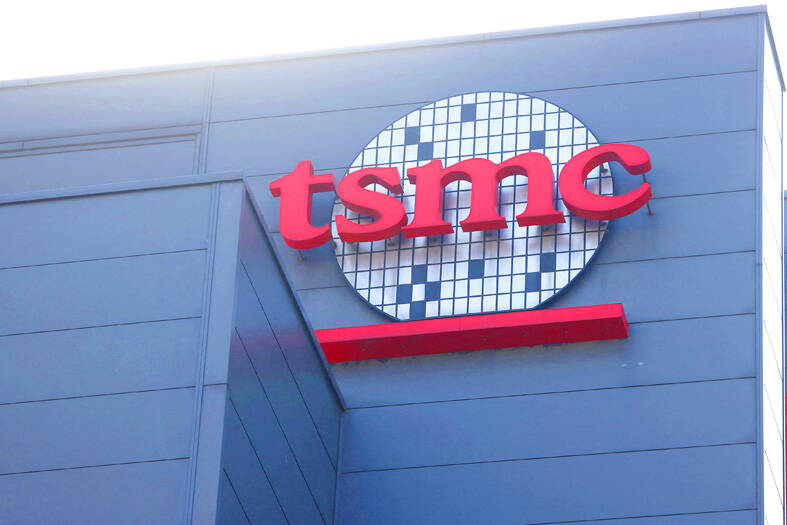Three Taiwanese firms made this year’s Global 500 list of the world’s most valuable brands published by London-based brand valuation and strategy consultancy Brand Finance.
The Taiwanese companies in the rankings are Taiwan Semiconductor Manufacturing Co (TSMC, 台積電) in 87th spot, Taipei Fubon Commercial Bank (台北富邦銀行) in 425th and a newcomer, Chunghwa Telecom Co (中華電信), in 447th, the Brand Finance Global 500 and IT Services 25 report released at the World Economic Forum in Davos on Wednesday showed.
Hsinchu-based TSMC, the world’s largest contract chipmaker, moved ahead from last year’s ranking at 93rd, while Taipei Fubon Bank rose from 385th.

Photo: Reuters, Ann Wang
Amazon.com Inc ranked as the world’s most valuable brand despite losing US$51 billion in value this year, with Brand Finance valuing Amazon’s brand at US$299.28 billion.
Apple Inc lost its top ranking after losing US$57.6 billion, finishing with a brand value of US$297.51 billion, followed by Google (US$281.38 billion), Microsoft Corp (US$191.57 billion) and Walmart Inc (US$113.78 billion).
Rounding out the top 10 were Samsung Group, Industrial & Commercial Bank of China Ltd (中國工商銀行), Verizon Communications Inc, Tesla Inc and TikTok.
The US has the most companies in the rankings, with 201 companies listed (49.7 percent), ahead of China’s 79 (17.9 percent) and Germany’s 24 (6 percent), the report said.
Brand Finance evaluates the strength of brands and quantifies their financial value to help organizations make strategic decisions.
The consultancy conducts more than 5,000 brand valuations every year, by assessing companies’ business model and performance, customer satisfaction, employee engagement and corporate social responsibility.

UNCERTAINTY: Innolux activated a stringent supply chain management mechanism, as it did during the COVID-19 pandemic, to ensure optimal inventory levels for customers Flat-panel display makers AUO Corp (友達) and Innolux Corp (群創) yesterday said that about 12 to 20 percent of their display business is at risk of potential US tariffs and that they would relocate production or shipment destinations to mitigate the levies’ effects. US tariffs would have a direct impact of US$200 million on AUO’s revenue, company chairman Paul Peng (彭雙浪) told reporters on the sidelines of the Touch Taiwan trade show in Taipei yesterday. That would make up about 12 percent of the company’s overall revenue. To cope with the tariff uncertainty, AUO plans to allocate its production to manufacturing facilities in

TAKING STOCK: A Taiwanese cookware firm in Vietnam urged customers to assess inventory or place orders early so shipments can reach the US while tariffs are paused Taiwanese businesses in Vietnam are exploring alternatives after the White House imposed a 46 percent import duty on Vietnamese goods, following US President Donald Trump’s announcement of “reciprocal” tariffs on the US’ trading partners. Lo Shih-liang (羅世良), chairman of Brico Industry Co (裕茂工業), a Taiwanese company that manufactures cast iron cookware and stove components in Vietnam, said that more than 40 percent of his business was tied to the US market, describing the constant US policy shifts as an emotional roller coaster. “I work during the day and stay up all night watching the news. I’ve been following US news until 3am

Taiwan will prioritize the development of silicon photonics by taking advantage of its strength in the semiconductor industry to build another shield to protect the local economy, National Development Council (NDC) Minister Paul Liu (劉鏡清) said yesterday. Speaking at a meeting of the legislature’s Economics Committee, Liu said Taiwan already has the artificial intelligence (AI) industry as a shield, after the semiconductor industry, to safeguard the country, and is looking at new unique fields to build more economic shields. While Taiwan will further strengthen its existing shields, over the longer term, the country is determined to focus on such potential segments as

COLLABORATION: Given Taiwan’s key position in global supply chains, the US firm is discussing strategies with local partners and clients to deal with global uncertainties Advanced Micro Devices Inc (AMD) yesterday said it is meeting with local ecosystem partners, including Taiwan Semiconductor Manufacturing Co (TSMC, 台積電), to discuss strategies, including long-term manufacturing, to navigate uncertainties such as US tariffs, as Taiwan occupies an important position in global supply chains. AMD chief executive officer Lisa Su (蘇姿丰) told reporters that Taiwan is an important part of the chip designer’s ecosystem and she is discussing with partners and customers in Taiwan to forge strong collaborations on different areas during this critical period. AMD has just become the first artificial-intelligence (AI) server chip customer of TSMC to utilize its advanced